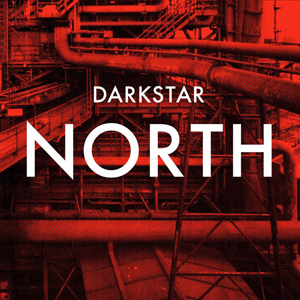Darkstar North
The London bass outfit adds a singer and delves into the pop world, with mixed […]

The London bass outfit adds a singer and delves into the pop world, with mixed results.
One of the most compelling releases of 2009 was Darkstar’s “Aidy’s Girl is a Computer,” a single that turned the post-dubstep soundworld on its head by amplifying the simple, sweet murmurs of robots in love. That wasn’t its only hook. The song hummed with just enough sub-bass thunder from below, hit the right targets in the mid-range with melodic synth lines and vocal trickery, and used two gorgeous breaks to inspired, dramatic effect. It is a stunning five minutes of near-perfection that holds up strong over a year later; it’s so good, in fact, that it overwhelms and undercuts the other nine tracks on Darkstar’s debut LP, North.
That’s not to say the full-length is short on ideas or charm. It has those in abundance. It is a fresh direction for Steve Goodman’s (a.k.a. Kode9) Hyperdub label—arguably the most innovative electronics-based imprint of the last five years—away from its UK rave/garage/2-step origins and into brave new, often lovely, pop territories.
The overall mood of North is melancholy, bleak, funereal—the music evokes cloudy, windswept days and vague pains of the heart. But unlike labelmate Burial, who explores similar sonic terrain, Darkstar doesn’t realize its sad mission. This sounds more like the Postal Service, Radiohead, or Orchestral Maneuvers in the Dark than it does anything resembling bass music in orientation. However, it should be said that some of the same emotional triggers used in Burial’s body of work—primarily echoes of good times forever gone—are in full play here.
The main problem is that the songs too often feel like sketches. The punchline is sold too quickly, the finish too abrupt. Just as “In the Wings” starts to soar, ironically, it begins to fade. It’s a beauty of an opener, a slow jam built around simple piano chords, that you want to hear played out over an extended period. Its length, at less than three minutes, seems abridged, as if the better version was twice as long and had more juice. You leave it feeling cheated.
“Gold,” the pitched-down remake of a Human League b-side, has the architecture of a synth-pop classic. But just when you want it to reach back for something extra, the song comes up short. Where “Aidy” seems to pull you inward, “Gold” remains aloof, bored with the cleverness of its interpretation—a bit too much like the worst tendencies in Radiohead, frankly.
The best track is the shimmery instrumental “Ostkreuz,” which recalls ambient German titans Cluster, and Bowie and Eno’s Low period, albeit heard through a granular filter. This technique is also used to process the vocals of singer James Buttery—a recent addition to the group made up of originals James Young and Aiden Whalley—on “2 Chords,” “Deadness,” and “Under One Roof,” all delivered with suitable pangs of regret set against epic waves of swelling sound and forward-marching rhythms.
Darkstar members say they consciously chose a distinct other path for North after the group’s 2009 breakthrough. It takes courage and confidence to change directions in mid-stream and challenge expectations, but it isn’t always the best decision. The fan base in the already small world that fell in love with “Aidy’s Girl” was likely waiting for a robotic dance force to emerge, not a sobering declaration that the party is over before it begins.

